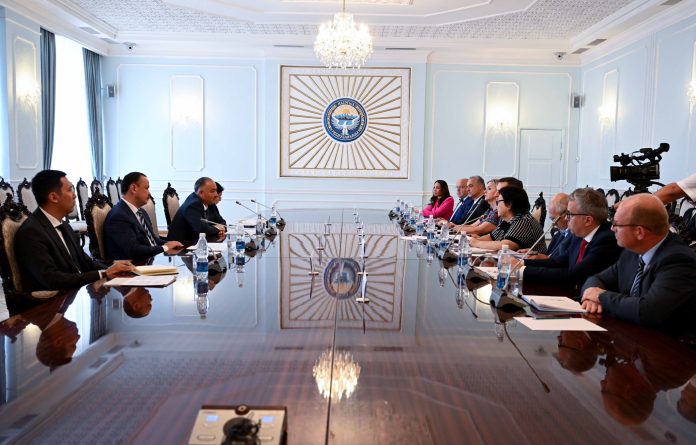MEPs have wrapped up a visit to Central Asia, where the issues of the circumvention of sanctions featured prominently in exchanges with high-level politicians and stakeholders.
The start of the Russian war of aggression against Ukraine has prompted significant geopolitical changes. To respond to these changes, the European Union has intensified its engagement with partners around the world, including in Central Asia. As part of this effort, a delegation of the Foreign Affairs Committee visited Kazakhstan and Kyrgyzstan on 21-25 August.
In Kazakhstan, the delegation met with parliamentarians of the Mazhilis, State Counsellor, the Minister of Economy, and Deputy Ministers of Foreign Affairs, Trade and Integration, and Industry and Infrastructural Development, representatives of civil society, and the Commissioner for Human Rights.
In Kyrgyzstan, the delegation met with President Sadyr Japarov, the Speaker and members of Kyrgyzstan’s Jogorku Kenesh and the Deputy Minister of Foreign Affairs, as well as representatives of civil society and independent media.
Following the visit, Foreign Affairs Committee Chair David McAllister (EPP, Germany) said: “Central Asia is a strategically important region for the European Union. Our visit to Kazakhstan and Kyrgyzstan reconfirmed the need for the EU to intensify its presence in and involvement with the countries of the region.
This is a period of challenges, but also opportunities, for developing our relations. The most pressing issue we raised was the risk of the circumvention of sanctions. We stated that sanctions are directed at the aggressors – Russia and Belarus, not the countries of Central Asia. Allowing sanction circumvention feeds the Russian war machine and results in a rising death toll in Ukraine.
We welcome the readiness of the two governments to work with the EU on this issue.
Connectivity provides the biggest potential for bilateral cooperation. Furthermore, it could foster regional cooperation and build trust in Central Asia. The Trans-Caspian corridor is an important alternative connection between Central Asia and Europe and facilitates direct access to the world markets without passing through countries under sanctions. The recently strengthened cooperation with Kazakhstan in the area of critical raw materials can bring additional significant mutual benefits.
We welcomed the political and economic reforms in Kazakhstan, which should continue.
We discussed the situation of human rights and civil society and expressed concerns regarding legislative initiatives affecting the media and NGOs in both countries. This should not lead to a shrinking space for civil society and independent media or a worsening of the human rights situation. Kyrgyzstan has long stood out as a positive example in the region in terms of its respect for human rights and fundamental freedoms. We encouraged our partners to stay on this path.”
Mr McAllister was accompanied by MEPs Željana Zovko (EPP, Croatia), Gheorghe-Vlad Nistor (EPP, Romania), Manolis Kefalogiannis (EPP, Greece), Karsten Lucke (S&D, Germany), Juozas Olekas (S&D, Lithuania) and Klemen Grošelj (Renew, Slovenia).

